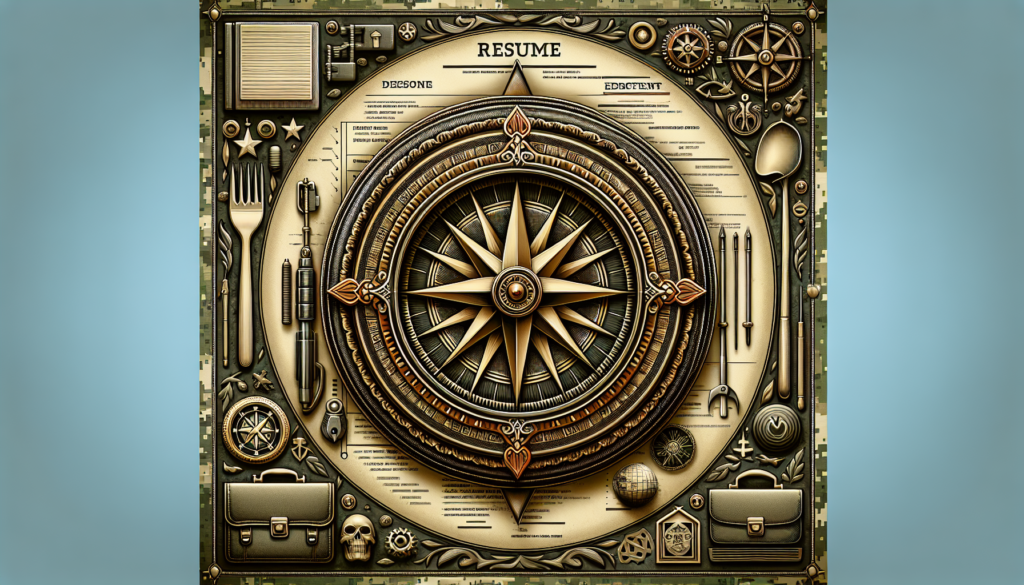Embarking on a journey from military to civilian life can be a complex transition, but fear not, for you’re not alone in this endeavor. “Military to Civilian Skill Mapping for Veterans” lights your way through the often-challenging process of reorienting your professional compass post-service. Every skill you’ve honed in uniform has a place in the civilian world, and with a trove of resources, our website assists in translating your military expertise into a language that resonates with civilian employers. It’s more than just finding a job; it’s about continuing to grow and succeed, using the invaluable experiences you’ve gained during your time in service. Connect with a community of peers, embrace the support you’ve earned, and let your veteran’s voice ring clear as you step confidently into this new chapter of your life.
Understanding the Challenge of Transition
Reintegrating into civilian life
You’ve given your all to serve your country, and now it’s time to hang up your uniform and start a new chapter. However, reintegration into civilian life isn’t a cakewalk. You’re now treading into a world that operates on different principles, schedules, and values. You might find this process disorienting as you adapt to a lifestyle that no longer revolves around active duty schedules and structures. Relearning the civilian way of life takes patience and perseverance, but remember, you’re not alone in this journey.
Overcoming stereotypes about military experience
You may encounter stereotypes regarding your military service, with some civilians having preconceived notions about your past profession. These can range from being seen as overly rigid to struggling with adapting to new environments. It’s important to dispel these misconceptions by demonstrating your ability to transition your skills and adapt to various situations. Remain confident and open-minded – your military experience is a strength, not a barrier.
Recognizing individual value beyond service
Acknowledging your value outside the armed forces is crucial. You are not defined solely by your military service but by the unique skills and experiences you bring to the table. Realize that your service has equipped you with a plethora of abilities and character traits that are indispensable in the civilian world. You’re a team player, a problem solver, and someone who can perform under pressure – attributes that are highly regarded in any field.
Identifying Transferable Skills
Soft skills honed in the military
In the military, you’ve developed a wealth of soft skills without even realizing it. Communication, adaptability, and resilience are part of your everyday life during service. You know how to follow through with commitment, manage stress, and operate effectively under duress. You’ve worked in culturally diverse environments and understand the importance of clear and precise communication. These soft skills are incredibly valuable in any work setting and lay a solid foundation for your civilian career.
Technical abilities applicable to civilian jobs
Beyond soft skills, your military service might have provided you with specialized technical skills. Depending on your role, you might be trained in IT, mechanical maintenance, logistics, or medicine. These technical abilities are highly sought after in the civilian job market. It’s key to identify the parallels between your military role and potential civilian jobs and to express these in terms that a civilian hiring manager will understand and appreciate.
Leadership and team-building expertise
Your military career has likely put you in leadership roles, where you’ve honed your ability to inspire, motivate, and guide others toward a common goal. You understand the nuances of team dynamics and how to bring out the best in your colleagues. This expertise is invaluable in any industry. There’s a growing demand for individuals who can lead by example, manage teams effectively, and foster positive work environments.

This image is property of images.pexels.com.
Assessment Tools for Skills Translation
Online platforms for skills evaluation
There are various online platforms designed to help you evaluate and translate your military skills into civilian lingo. These tools often allow you to input your military occupational specialty and see a list of corresponding civilian job titles and descriptions. They can guide you in understanding how your specific military experience can align with jobs in the civilian sector.
Government and nonprofit resources
Take advantage of government and nonprofit resources dedicated to helping veterans transition into civilian life. Many such organizations provide assessment tools and support services to assist you in identifying your transferable skills and understanding how they relate to civilian jobs. They also offer workshops and individual counseling to further assist you in your career transition.
Personalized career counseling for veterans
Personalized career counseling can be a tremendous help as you navigate the daunting world of civilian employment. Career counselors who specialize in supporting veterans can provide tailored advice based on your unique military experience and aspirations. They can also help you overcome any barriers to employment and sharpen your job-seeking skills.
Education and Certification
Equating military training to academic credits
Your military training and experiences can potentially be translated into academic credits. Many educational institutions recognize the value of military training and offer credit for specific courses or programs. Investigating these possibilities can give you a head start on further education and help you achieve your academic goals more quickly.
Pursuing additional education and certification
Even with extensive military training, you might find that pursuing additional education and certification is beneficial. This can not only fill any gaps in your knowledge but also demonstrate your commitment to learning and adapting to new fields. Whether it’s a degree program or a specialized certification, further education will enhance your desirability to potential employers.
Utilizing the GI Bill and other educational benefits
Remember to take advantage of the GI Bill and other educational benefits available to veterans. These programs can cover tuition costs, provide housing allowances, and help with other expenses associated with education. They are powerful tools at your disposal to ease the financial burden of pursuing further education or training for your civilian career.

This image is property of images.pexels.com.
Building a Civilian Resume
Articulating military experience in civilian terms
When crafting your resume, it’s essential to translate military jargon into civilian terms that hiring managers can understand. Avoid using acronyms and military-specific language. Instead, focus on explaining your responsibilities and achievements in a way that highlights your value to a civilian employer. Emphasize outcomes and how your role contributed to the success of your unit or mission.
Highlighting leadership and mission-focused achievements
Don’t be modest about your leadership roles and the missions you’ve undertaken. Make sure to highlight these aspects, emphasizing how they’ve equipped you with strategic planning, decision-making, and project management skills. Explain how these achievements required coordination, dedication, and a results-oriented approach – all of which are transferable and valuable in the civilian workplace.
Tailoring resumes for targeted job applications
It’s not enough to have a one-size-fits-all resume. Each role you apply for might need a slightly different approach. Tailor your resume to fit the job description, focusing on relevant experience and skills that align with what the employer is looking for. This targeted approach will increase your chances of catching the attention of recruiters and landing job interviews.
Networking for Success
Leveraging military connections
Your military network is an invaluable asset. Keep in touch with your former comrades who have transitioned to civilian careers. They can offer advice, introduce you to opportunities, and serve as references. Their insights on navigating the transition could prove to be a goldmine for your civilian career.
Engaging with veteran support organizations
Engage actively with veteran support organizations. They often hold networking events, job fairs, and provide resources for job seekers. These associations are not only there to support you in practical matters, but they can also help you feel a sense of community and shared purpose.
Utilizing LinkedIn and other professional social platforms
Create a robust presence on LinkedIn and other professional social media platforms. These tools are key for networking, researching companies, and applying for jobs. Make sure your profile is complete, professional, and reflects your military experiences in terms that resonate with civilian employers. Engage with industry groups and participate in discussions to increase your visibility and connect with potential employers.

This image is property of images.pexels.com.
Understanding the Civilian Workplace Culture
Adjusting from a military to a civilian work environment
One of the biggest challenges you may face is adjusting to the culture of a civilian workplace. It’s often less hierarchical than the military and can have different expectations around communication and decision-making. Be prepared to adapt to a more collaborative environment, where initiative and input from all levels are encouraged and expected.
Decoding corporate language and customs
The vernacular of the civilian workplace can seem foreign at first, with its own set of acronyms, jargon, and business etiquette. Don’t be discouraged; just as you learned military terminology, you can learn the language of the corporate world. Observe and ask questions when necessary to navigate this new terrain confidently.
Embracing diversity and inclusion
The civilian workplace often places a high value on diversity and inclusion. Embrace the range of perspectives and backgrounds you’ll encounter, just as you did in the military. This diversity is a strength, and your ability to work with people from all walks of life is an asset.
Effective Job Search Strategies
Utilizing veteran-friendly job search engines
Several job search engines and employment websites cater specifically to veterans. These can be excellent starting points for your job search as they often filter opportunities that are particularly suitable for individuals with military experience. They might also offer resources to help with resume building and interview preparations.

